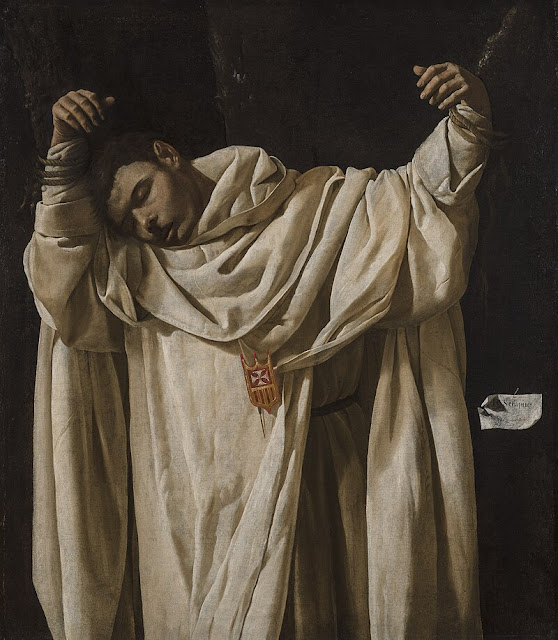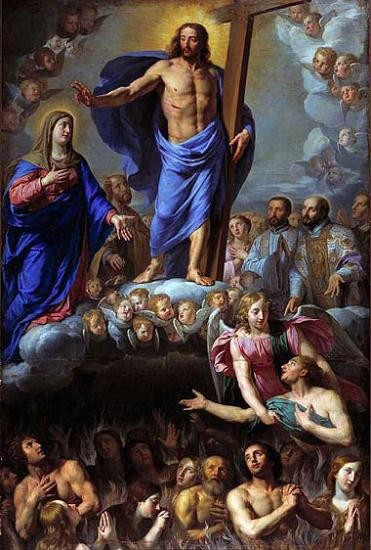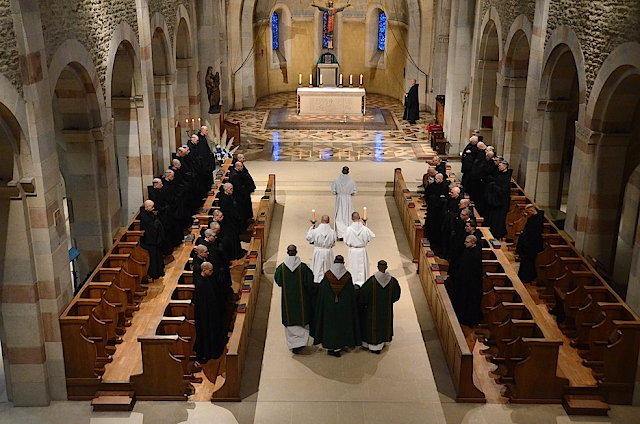Catholic devotions for the 14th November
Scroll down for today's
Saint of the Day/ Feast
Reading of the Martyrology
Dedication of the Month
Dedication of the Day
Rosary
Five Wounds Rosary in Latin
Seven Sorrows Rosary in English
Latin Monastic Office
Reading of the Rule of Saint Benedict
Celebration of Mass
Reading from the School of Jesus Crucified
Serapion of Algiers (1179 – 14 November 1240) was an English Catholic Mercedarian priest and martyr. Thomas O'Loughlin says Serapion was Scottish by birth. Serapion is acknowledged as a proto-martyr. He was the first of his Order to merit the palm of martyrdom by being crucified and cut to pieces.
Life
It has been said that he once served in the armies of Richard the Lion-Heart and Leopold VI during the time of the Crusades. He accompanied his father during the Crusades in his childhood and was present at a battle at Acre in 1191. He participated in the Reconquista while serving in the armed forces for either Alfonso VIII of Castile or Alfonso IX of León. He met Peter Nolasco in Barcelona and became a professed member of the Mercedarians in 1222. The Mercedarians' goal was to free Christian captives held in Muslim states. He was assigned to recruit for the order in England but pirates besieged the ship and left him for dead. He survived and wandered to London to preach which landed him in trouble and he was ordered to leave the town.
Death
There are various accounts of his death. By one account, he was beaten to death by French pirates at Marseilles.
He made two journeys for the ransom of captives, in 1240. The first was to Murcia, in which he purchased the liberty of ninety-eight slaves: the second to Algiers, in which he redeemed eighty-seven, but remained himself a hostage for the full payment of the money. A widely circulated early account holds that the ransom did not arrive in time and so his captors decided to have him killed. He was nailed on an X-shaped cross and was dismembered.
The most authoritative account comes from the early annals of the Mercedarians. "Captured in Scotland by English pirates, Serapion was bound by the hands and feet to two poles, and was then beaten, dismembered, and disemboweled. Finally, his neck was partly severed, leaving his head to dangle."
The Baroque artist Francisco Zurbarán depicts the Martyrdom of Saint Serapion in one of his paintings.
Pope Benedict XIII declared Serapion a martyr, and approved his veneration in the Order of Mercedarians, by a decree in 1728. Pope Benedict XIV added him to the Roman Martyrology. Serapion is commemorated on 14 November.
The Reading from the Martyrology
This Day, the Fourtenth Day of November
At Caccamo in Sicily, Blessed John Liccio, confessor, of the Order of Preachers. He was notable for his eloquence in speaking of divine things, for charity toward his neighbor, for the propagation of the Rosary, for striving after regular observance, and for other virtues. At the age of one hundred and eleven, he quietly rested in the Lord. A semi-duplex feast.
St. Josaphat, of the Order of St. Basil, a Polish archbishop and martyr, whose birthday is remembered on November 12.
At Gangra in Paphlagonia, St. Hypatius, bishop. While on the way home from the great Nicene Council, he was stoned by Novatian heretics and thus died a martyr.
At Heraclea in Thrace, the birthday of the holy martyrs Clementinus, Theodotus, and Philomenus.
At Alexandria, St. Serapion, martyr. In the reign of the Emperor Decius, the executioners inflicted on him the most cruel sufferings. After they had broken the joints of all his limbs, they flung him off the roof of his house, and so he became a glorious martyr of Christ.
At Troyes in Gaul, St. Venerandus, martyr, under the Emperor Aurelian.
In Gaul, St. Veneranda, virgin. She received the crown of martyrdom under the Emperor Antoninus and the governor Asclepiades.
At Emesa in Phoenicia, the suffering of many holy women. They were most brutally tortured and slain for the Christian faith under the cruel Arab chief Mady.
At Bologna, St. Jucundus, bishop and confessor.
At Eu in Gaul, St. Lawrence, Bishop of Dublin.
At Tours in Gaul, St. Britius, bishop, who, on November 13, died in the Lord. A memory.
At Algiers in Africa, Blessed Serapion. He was the first one of the Order of our Lady of Ransom to merit obtaining the palm of martyrdom. Because he redeemed the faithful from captivity and preached the Christian faith, he was crucified and then cut to pieces limb from limb.
Omnes sancti Mártyres, oráte pro nobis.
("All ye Holy Martyrs, pray for us", from the Litaniae Sanctorum, the Litany of the Saints)
November is the Month of the Poor Souls in Purgatory
Three Thousand Days of Indulgences for the relief of the “Poor Souls” in Purgatory to be obtained by saying the following ejaculations (Part 2/4):
7. Holy, Holy, Holy, Lord God of Hosts, earth is full of Thy glory. Glory be to the Father, Glory be to the Son, Glory be to the Holy Ghost.
(100 days once a day, and three times on Sunday, and during the octave of the Holy Trinity. Clement XIV., June 6, 1769.)
8. Sweet Heart of Jesus, be my love.
(300 days once a day. Leo XIII., May 21, 1892.)
9. Sweetest Jesus, be to me not a judge but a Savior.
(50 days each time. Pius IX., Aug. 11, 1851.)
10. My Jesus, mercy!
100 days each time. Pius IX., Sept. 24, 1846.)
11. O Jesus, my God, I love Thee above all things.
(50 days each time. Pius IX., Pr. Ma., May 7, 1854.)
12. Sweet Heart of Mary, be my salvation!
(300 days each time. Pius IX., Sept. 30, 1852
Tuesday is the Day dedicated to the Holy Angels
Tuesdays, in addition to honoring the Angels, are the day for honoring the Holy Face and honoring St. Anthony of Padua. On the Tuesday after St. Anthony's death, the day his funeral cortege took his body to the church, many miracles took place, so this day is commemorated in his honor. A special Novena to St. Martha is also made on nine consecutive Tuesdays (or on all Tuesdays) by some Catholics.
Commemoration of Saint Anthony
O Doctor optime, Ecclesiae sanctae lumen, beate Antoni, divinae legis amator, deprecare pro nobis Filium Dei.
O illustrious Doctor, light of holy Church, blessed Anthony, lover of divine law, pray for us to the Son of God.
V. Iustum deduxit Dominus per vias rectas.
R. Et ostendit illi regnum Dei.
V. The Lord guided the just in the paths of righteousness
R. And He showed him the kingdom of God.
Oremus: Ecclesiam tuam, Deus, beati Antonii Confessoris tui atque Doctoris sollemnitas votiva laetificet: ut spiritualibus semper muniatur auxiliis, et gaudiis perfrui mereatur aeternis. Per Dominum Iesum Christum. R. Amen.
Let us pray: May the votive solemnity of blessed Anthony, thy Confessor and Doctor, be to thy Church, O God, a cause of joy. May it ever be defended by spiritual assistance, and deserve to possess eternal joys. Through Christ our Lord. R. Amen.
The Sorrowful Mysteries of the Rosary are prayed on Tuesday
"I would like to remind you that the Rosary is a biblical prayer, all filled with the Holy Scriptures." It is a prayer from the heart, in which the repetition of the Ave Maria directs the thought and affection towards Christ, and thus is made a confident prayer to Him and our Mother. It is a prayer that helps to meditate on the Word of God and assimilate the Eucharistic Communion, on the model of Mary who kept in her heart everything Jesus did and said and even His Presence. " Pope Benedict XVI
The Rosary in Latin
Chaplet of the Five Holy Wounds of Christ in Latin
Chaplet of the Seven Sorrows of Our Lady in English
Latin Monastic Office for today from Le Barroux in France Texts also provided
XXXVI DE INFIRMIS FRATRIBUS
1 Infirmorum cura ante omnia et super omnia adhibenda est, ut sicut revera Christo ita eis serviatur,
2 quia ipse dixit: Infirmus fui et visitastis me,
3 et: Quod fecistis uni de his minimis mihi fecistis.
4 Sed et ipsi infirmi considerent in honorem Dei sibi servire, et non superfluitate sua contristent fratres suos servientes sibi;
5 qui tamen patienter portandi sunt, quia de talibus copiosior merces acquiritur.
6 Ergo cura maxima sit abbati ne aliquam neglegentiam patiantur.
7 Quibus fratribus infirmis sit cella super se deputata et servitor timens Deum et diligens ac sollicitus.
8 Balnearum usus infirmis quotiens expedit offeratur sanis autem et maxime iuvenibus tardius concedatur.
9 Sed et carnium esus infirmis omnino debilibus pro reparatione concedatur; at, ubi meliorati fuerunt, a carnibus more solito omnes abstineant.
10 Curam autem maximam habeat abbas ne a cellarariis aut a servitoribus neglegantur infirmi. Et ipsum respicit quicquid a discipulis delinquitur.
CHAPTER 36: THE SICK BROTHERS
1 Care of the sick must rank before and above everything, so that they may truly be served as Christ Himself,
2 for He said: I was sick and you visited me (Matt 25:36)
3 and, Whatr you did for one of these who are least, you did for me (Matt 25:40).
4 But let the sick are themselves to consider that they are served out of honor for God, and they are not to sadden their brothers who serve them with superfluous demands;
5 Yet they are to be patiently borne with, because from such as these a more abundant reward is acquired.
6 The abbot shall therefore exercise the greatest care that they not suffer any neglect.
7 These brothers who are sick are to be assigned a separate room and a God-fearing attendant who is also diligent and solicitous.
8 Baths may be offered the sick whenever this is helpful, but those who are healthy, especially the young are to be allowed this less frequently.
9 Additionally, the sick who are very weak may be allowed to eat meat to recover their strength; but when they are better, all are to abstain from meat as usual.
10 Moreover the abbot is to maintain the greatest care that that the sick are not neglected by the cellarers or attendants. For he is responsible for whatever is lacking in his disciples.
Today's Celebration of the Mass
May the Passion of Jesus Christ be always in our hearts













.jpeg)

Comments